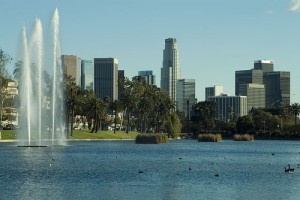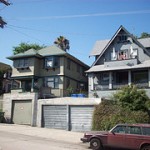Echo Park Overpriced
Posted: August 5th, 2010 | Author: jenny | Filed under: Uncategorized | 3 Comments »One of the tools we can use to assess housing prices in a specific area is the income to home price ratio. Generally, median disposable household income should be able to support the median home price.  Disposable income is gross income minus current taxes.  The traditionally sound formula for assessing whether a particular home is affordable is that the home should not exceed two and a half to three times the buyer’s household income. Certain metropolitan areas can be more expensive and the ratio might run a bit wider. Where I live in Los Angeles, for example, we have historically seen a ratio closer to three and a half times annual income.
From time to time I like to take a look at home pricing in a particular neighborhood in the Los Angeles area. A couple of months ago I examined the situation in Burbank in my post LA Housing Is Still Too Expensive .  At the request of Xtine from the blog Flip City I have now run the numbers for Echo Park.
 Echo Park is an older Los Angeles neighborhood just northwest of the downtown area. By older, I mean largely built up in the 1920s and ’30s. It was initially the bedroom community of the silent film industry and later became a predominantly working class Latino community. It has always been known for its artists and bohemian culture. Echo Park has seen a lot of gentrification over the last fifteen years or so, which really picked up during the housing bubble years with all the excess faux wealth floating around. Prices skyrocketed during this time and it is now unaffordable to most prospective buyers. But is this justified? Let’s take a look.
Echo Park is an older Los Angeles neighborhood just northwest of the downtown area. By older, I mean largely built up in the 1920s and ’30s. It was initially the bedroom community of the silent film industry and later became a predominantly working class Latino community. It has always been known for its artists and bohemian culture. Echo Park has seen a lot of gentrification over the last fifteen years or so, which really picked up during the housing bubble years with all the excess faux wealth floating around. Prices skyrocketed during this time and it is now unaffordable to most prospective buyers. But is this justified? Let’s take a look.
 The annual median household income in Echo Park is around $36,000 as of 2008, with close to a third of households living under the poverty line. I was not able to find newer statistics regarding income, but I don’t imagine it has risen over the past two years. Given the 12%-plus unemployment rate in California and continuing budget cuts and furloughs, I think we can assume this number has not grown much, if at all.
The annual median household income in Echo Park is around $36,000 as of 2008, with close to a third of households living under the poverty line. I was not able to find newer statistics regarding income, but I don’t imagine it has risen over the past two years. Given the 12%-plus unemployment rate in California and continuing budget cuts and furloughs, I think we can assume this number has not grown much, if at all.
The median selling price of a single family residence in Echo park from April through June of this year was $374,000. This is far below the lofty median of $680,000 we saw at the bubble’s peak, but still up $79,000 from last year. I imagine the latest bounce was due largely to buyers rushing to get in on the federal tax credit that came to an end during that period, thereby creating a temporary surge in demand.  If we look at the market without the stimulus of the tax credit we can estimate the median selling price would be around $300,000.
 So, let’s examine the income to home price ratio and see where Echo Park stands in its current valuation. If we take the statistics at face value we can see that with an annual household income of $36,000 in the area the median home price, at three times that, would be justified somewhere in the area of $108,000. If we consider that this is historically a somewhat more expensive area and run the figure at four times the annual household income we can see the median priced home should be running around $145,000.  Note that I am using gross income statistics here, not the reduced disposable income figures which would really afford less than that.
So, let’s examine the income to home price ratio and see where Echo Park stands in its current valuation. If we take the statistics at face value we can see that with an annual household income of $36,000 in the area the median home price, at three times that, would be justified somewhere in the area of $108,000. If we consider that this is historically a somewhat more expensive area and run the figure at four times the annual household income we can see the median priced home should be running around $145,000.  Note that I am using gross income statistics here, not the reduced disposable income figures which would really afford less than that.
So in the very best case scenario for home price valuation we are looking at an ideal median price of $145,000 for Echo Park, but the actual home price median is running at $374,000!  That’s ten times the median gross income of the town’s residents.  Even if you adjust for the stimulus of the expired tax credit and suppose prices will return to $300,000, you are still looking at overvaluation of more than fifty percent. So we can conclude that prices in Echo Park are still much too high. There is room for home prices in Echo Park to drop by at least half.
Echo Park Income Statistics:
citydata.com
http://www.city-data.comEcho Park Home Prices:
Trulia Real Estate Search
http://www.trulia.com
Jenny, here are a couple of things that might be keeping Echo Park real estate from dropping to a more reasonable income/price ratio. First, maybe people with incomes in the median 36,000/yr range are a) getting two or three incomes to pay for one house or b) renting most of the house out to pay the mortgage. These are very common strategies developed during the housing bubble to allow people to purchase real estate. Second, it could be the case that the houses that are now being sold are being bought by people way over the median income for the area. There may be a lot of people in Echo Park that already own their home outright (and have for generations), and have very low incomes. The “gentrification” of the neighborhood keeps housing prices very high, but the overall low incomes of homeowners keeps the median at 36,000/yr.
There is such a huge income and wealth disparity in the US now that attractive neighborhoods will continue to remain priced for people who make a lot more than the avg. income.
Casey
Interesting thoughts, thanks. Xtine also brings up gentrification at Flip City. Theoretically the higher prices gentrification brings in should be justified by the higher incomes coming in and the ratio wouldn’t show a widening. Also consider:
1) The $36K figure is household income, not personal income, and would include households where people have pooled incomes to buy. The average household size in EP is 3.2 people, which does not seem to indicate this sort of buying has happened to an extensive degree.
2) A home at the median of $374K requires a household income of $125K to avoid risk of foreclosure. Fewer than 2000 of the 17,372 households (around 10%) in EP bring in that much. Probably not a huge influence on the median.
3) Burbank shows a similar income-to-price displacement. It is not a neighborhood experiencing gentrification. See my earlier post LA Housing is Still Too Expensive.
4) Fewer than a third of all LA households bring in $100K a year. While EP is an attractive neighborhood, it is certainly not in the top third of high end real estate in Los Angeles.
5) I believe, along with the tax credit factor, the rise in median price is not indicating an overall price rise but rather a price drop in the mid to high tier market due to foreclosure activity and an overall decline in housing prices. I will examine this in more depth in a later post.
[…] Echo Park Overpriced […]